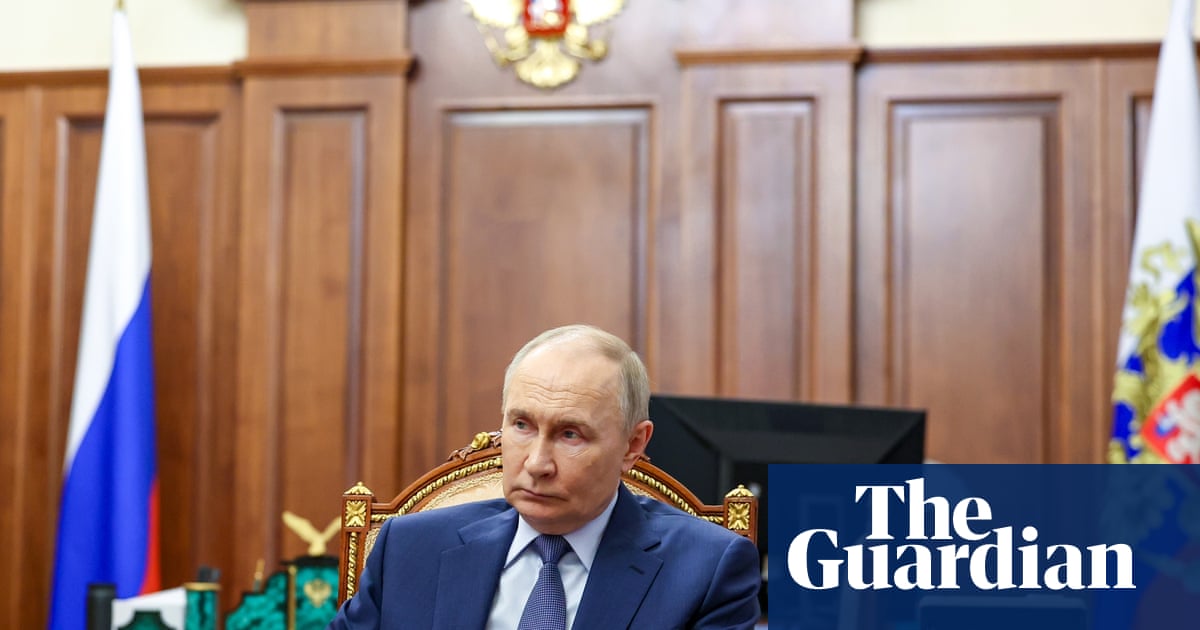On 13 June, the Guardian published acollective letter concerning Russia’s warand attacking Dr Fiona Hill, the chancellor of Durham University and one of the principal authors of the UK’s strategic defence review. As UK-based and/or British-educated experts in matters pertaining to Russia, Ukraine and international security, we voice our profound disagreement with the letter by Robert Skidelsky, Richard Balfe, Anthony Brenton, Thomas Fazi, Anatol Lieven, Ian Proud, Geoffrey Roberts, Richard Sakwa and Brigitte Granville.
They say that Dr Hill represents “the warmongering mood of official Britain”. But there is only one warmonger on the European stage, and that isVladimir Putin. It is neither a “false premise” nor a “mad conclusion” to argue that Putin’s invasion of Ukraine has the goal of restoring Russia to the status of a world power, and that the departure of the US would leave Russia “the dominant military power in all of Europe”. In reality, governments and independent experts from across Europe, ourselves included, have reached conclusions very similar to Dr Hill’s, as they are supported by empirical evidence – not least by Putin’s own overtly stated aspirations.
One wonders what “precautions” the signatories would advise Britain to take in the event of a US pullout from Europe. The once – and perhaps still – friendly contacts in Russian officialdom that some of the letter’s authors maintain will not help.
Roy AllisonSchool of Global and Area Studies, University of OxfordTimothy Garton AshFaculty of History, University of OxfordAnders ÅslundStockholm Free World Forum, Sweden (DPhil Oxford)Rostyslav AverchukVoxUkraine, Kyiv (BA Oxford)Jaroslava BarbieriRussia and Eurasia Programme, Chatham House, LondonIan BondThe Centre for European Reform, LondonLaurie BristowAmbassador to Russia 2016-20, Cambridge, UKMaksym ButkevychPrinciple of Hope Foundation, Kyiv (MA Sussex)Edward Hunter ChristieFinnish Institute of International Affairs, Helsinki (MSc LSE)Ruth DeyermondDepartment of War Studies, King’s College LondonSasha DovzhykINDEX: Institute for Documentation and Exchange, Lviv (PhD Birkbeck)Marta DyczokWestern University, London, Ontario (DPhil Oxford)Julie FedorThe University of Melbourne, Australia (PhD Cambridge)Emily FinerSchool of Modern Languages, University of St AndrewsRory FinninFaculty of Modern and Medieval Languages, University of CambridgeLawrence FreedmanDepartment of War Studies, King’s College LondonMischa GabowitschJohannes Gutenberg University of Mainz, Germany (BA Oxford)Ian GarnerPilecki Institute, Warsaw, Poland (BA Bristol)Keir GilesRussia and Eurasia Programme, Chatham House, LondonPaul GoodeCarleton University, Ottawa, Ontario (DPhil Oxford)Thomas GrantWolfson College, University of CambridgeSamuel GreeneSchool of Politics and Economics, King’s College LondonAgnia GrigasAtlantic Council, Washington, DC (DPhil Oxford)Hubertus JahnClare College, University of CambridgePolly JonesFaculty of Medieval and Modern Languages, University of OxfordIvan U KłyszczInternational Centre for Defence and Security, Tallinn (IM Glasgow)Amy W KnightIndependent Scholar, Summit, New Jersey (PhD LSE)Natasha KuhrtDepartment of War Studies, King’s College LondonTaras KuzioNational University of Kyiv-Mohyla Academy (PhD Birmingham)Simon LewisUniversity of Bremen, Germany (PhD Cambridge)Klara LindströmStockholm Centre for Eastern European Studies (BA Oxford)Bobo LoIndependent international relations analyst, Brighton, East SussexJohn LoughRussia and Eurasia Programme, Chatham House, LondonEdward LucasCentre for European Policy Analysis, Washington/LondonOrysia LutsevychRussia and Eurasia Programme, Chatham House, LondonClaudia MajorGerman Marshall Fund of the US, Berlin (PhD Birmingham)Luke MarchSchool of Social and Political Science, University of EdinburghDaria MattinglyDepartment of History, University of ChichesterMichael McFaulStanford University, Palo Alto, California (DPhil Oxford)Jade McGlynnDepartment of War Studies, King’s College LondonBohdan NahayloKyiv Post – Ukraine’s Global Voice, Kyiv/Barcelona (BA Leeds)James NixeyConflict Studies Research Centre, Shrivenham, OxfordshirePhillips O’BrienSchool of International Relations, University of St AndrewsOlga OnuchSchool of Social Sciences, University of ManchesterIngerid M OpdahlInstitute for Defence Studies, Oslo (PhD Birmingham)Carolina Vendil PallinRoyal Swedish Academy of War Sciences, Stockholm (PhD LSE)Peter RutlandWesleyan University, Middletown, Connecticut (BA Oxford)Gwendolyn SasseHumboldt University of Berlin, Germany (PhD LSE)Anton ShekhovtsovCentral European University, Vienna (PhD UCL)James SherrRussia and Eurasia Programme, Chatham House, LondonOxana ShevelTufts University,Massachusetts (MPhil Cambridge)Iryna ShuvalovaFaculty of Humanities, University of Oslo (PhD Cambridge)Timothy D SnyderUniversity of Toronto, Ontario (DPhil Oxford)Joanna SzostekSchool of Social and Political Sciences, University of GlasgowMaximilian TerhalleHoover Institution, Stanford, California (MA SOAS)Nikolaus von TwickelCentre for Liberal Modernity, Berlin (MA King’s College London)Andreas UmlandStockholm Centre for Eastern European Studies (PhD Cambridge)Adam UreLvivski Consulting, London (PhD UCL)Fredrik WesslauStockholm Centre for Eastern European Studies (BSc LSE)Sarah WhitmoreSchool of Law and Social Sciences, Oxford Brookes UniversityAndrew WilsonSchool of Slavonic and East European Studies, UCLKataryna WolczukSchool of Government, University of BirminghamStefan WolffSchool of Government, University of BirminghamMychailo WynnyckyjNational University of Kyiv-Mohyla Academy (PhD Cambridge)Yuliya YurchenkoSchool of Accounting, Finance & Economics, University of Greenwich
